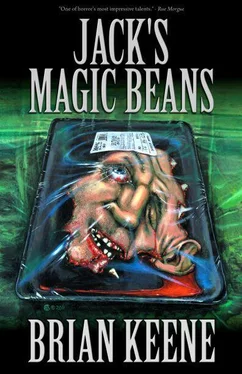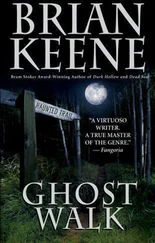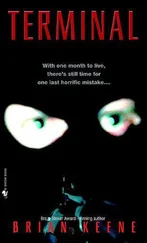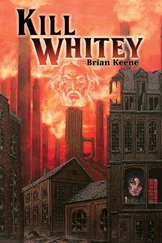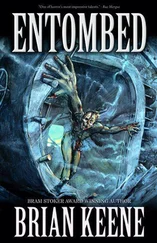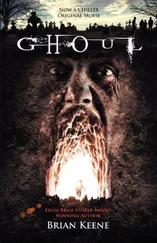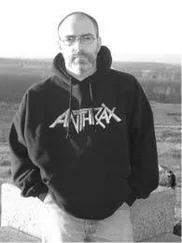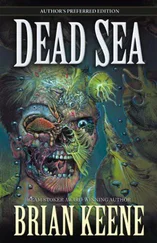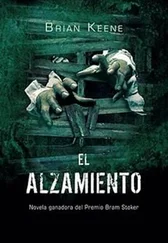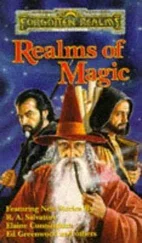This is the old part of the city, Finley thought. The oldest. The dark heart.
The very atmosphere seemed to echo his discomfort, accentuating it as they went farther. There were no streetlights in this section, and no lights shining in the windows of the houses. The buildings crowded together; crumbling statues of crumbling nineteenth century architecture. The street smelled faintly of garbage and stale urine, and the only sound was that of dripping water, and of something small scuttling in the darkness. Kathryn gripped his hand tightly, and then—
—they emerged onto the corner, and the lights and noise flooded back again. A crowd milled about in front of the theatre. Finley’s apprehension dissipated, and he chided himself for being silly. At the same time, Kathryn’s grip loosened.
“Look at this crowd!” Kathryn exclaimed. “It’s more popular than we thought.”
“Word of mouth must have spread fast.”
“Maybe your homeless friend has been pimping it.”
Finley grinned. “Maybe.”
They took their place at the end of the line, behind a young Goth couple. The theatre had seen better days. The water-stained brickwork looked tired and faded. Several windows on the second floor had been boarded over, and the others were dark. Some of the light bulbs in the marquee had burned out, but HASTUR PRODUCTIONS’ YELLOW and the show time and ticket prices were prominently visible. One side of the building was plastered with paper billboards promoting the play. Others advertised bands with names like Your Kid’s On Fire, Suicide Run, and I, Chaos.
The line snaked forward, and finally it was their turn. Finley stared at the man behind the glass window of the ticket booth. His skin was pale, almost opaque, and tiny blue veins spider-webbed his face and hands. Gray lips flopped like two pieces of raw liver as he spoke.
“Enjoy the performance.”
Finley nodded. Placing his arm around Kathryn’s waist, he guided them into the building. The usher in the lobby had the same alabaster complexion, and was slightly more laconic than his sullen ticket booth counterpart. Without a word, he took their tickets, handed back the stubs and two programs, then silently parted a pair of black curtains and gestured for them to enter.
The theatre filled quickly. They found a spot midway down the center aisle. The red velvet-covered chairs squeaked as they sat down.
“I can’t get over it,” Kathryn whispered. “Look at all these people!”
Finley studied the program booklet. Like the posters, it was designed to appear as if it had been bound in serpent skin. He struggled to read the pale lettering.
“YELLOW was written in the late 19th century by a young playwright named Castaigne. Tragically, Castaigne took his own life immediately upon completing the work. When YELLOW was first published and performed, the city of Paris banned the play, followed by Munich and London, and eventually most of the world’s governments and churches. It was translated in 1930 by the scholar Daniel Mason Winfield-Harms; who, in a strange twist of fate echoing that of the original author, was found dead in Buffalo, New York after finishing the adaptation. YELLOW takes place, not on Earth, but on another world, in the city of Yhtill, on the shore of the Lake of Hali, under the stars of Aldebaran and Hyades.”
Kathryn stirred next to him. “You know what this reminds me of?”
“What?”
“When I was in high school. At midnight on Saturdays, we’d go to see The Rocky Horror Picture Show . It has that feel to it.”
“Maybe they’ll sing ‘The Time Warp.’”
She reached over and squeezed his hand, and Finley felt good. Happy.
The lights dimmed, plunging them into darkness. The crowd grew silent as a burst of static coughed from the overhead speakers. Then, an eerie, unfamiliar style of music began. A light appeared at the back of the theatre. The performers entered from the rear, each of them carrying a single candle. The troupe walked slowly down the center aisle, singing as they approached the stage.
“Have you seen the Yellow Sign? Have you found the Yellow Sign?”
As they passed by, Finley forcibly resisting the urge to reach out and touch them. The resemblance to their dead alter egos was uncanny. The actress playing Janis Joplin (playing the Queen) was a perfect duplicate, down to the blue-tinged skin that must have adorned her face in death. Following her were Jim Morrison (a bloated Aldones) and John Lennon (a Thale with fresh bloodstains on his clothing). Mama Cass, Jimi Hendrix, Sid Vicious—the procession continued, until two-dozen actors had taken the stage.
“Look at that!” Kathryn pointed to the quarter-sized drops of blood left in the Lennon actor’s wake. “Gruesome. I can’t wait to see what they did with Kurt Cobain…”
Finley shuddered. “Good special effects, that’s for sure.”
The singing swelled, the upraised voices echoing like thunder. “Have you seen the Yellow Sign? Have you found the Yellow Sign? Let the red dawn surmise what we shall do, when this blue starlight dies and all is through. Have you seen the Yellow Sign? Have you found the Yellow Sign?”
They repeated the chorus two more times. On the last note, the candles were extinguished and the lights on the stage grew brighter.
The first part of the play concerned the intrigue of the royal court. The aging Queen was pestered and plied by her children: Cassilda, Alar, Camilla, Thale, Uoht, and Aldones, all claimants for the throne to Yhtill. They vied for the crown, so that the dynasty would continue, each one claiming to be to be the rightful successor. Despite their efforts, the Queen declined to give the crown away. Mama Cass began to sing, and Finley’s skin prickled.
“Along the shore the cloud waves break. The twin suns sink behind the lake. The shadows lengthen, in Carcosa. Strange is the night where black stars rise, and strange moons circle through the skies. But stranger still is lost Carcosa. Songs that the Hyades shall sing, where flap the tatters of the King, must die unheard in dim Carcosa. Song of my soul, my voice is dead, die though, unsung, as tears unshed shall dry and die in lost Carcosa.”
The crowd applauded, enraptured with her performance. Then the Cobain character appeared on stage, his face hidden beneath a pallid mask. When he turned his back to the audience, the crowd gasped. Hair and skull were gone, offering a glimpse of gray matter.
Finley had trouble following the plot after that.
Cobain’s character, the Phantom of Truth, pronounced doom upon the Queen and her subjects. The threat apparently came from a non-existent city that would appear on the other side of the lake. Reacting to this news, the Queen ordered him tortured.
Though Kathryn seemed enraptured, Finley grew restless as it continued. He found it incoherent to the point of absurdity. One moment, a character professed their love for another. The next, they discussed a race of people who lacked anuses, and could consume only milk, evacuating their waste through vomiting. The characters rambled on, and Finley slipped into a half conscious state—his mind adrift with other matters but the actor’s lines droned on in the back of his head.
“There are so many things which are impossible to explain! Why should certain chords of music make me think of the brown and golden tints of autumn foliage?”
“Let the red dawn surmise…”
“Aldebaran and the Hyades have aligned, my Queen!”
“What we shall do…”
“Sleep now, the blessed sleep, and be not troubled by these ill omens.”
“When this blue starlight dies…”
“The City of Carcosa has appeared on the other side of Lake Hali!”
“And all is through…”
Читать дальше
